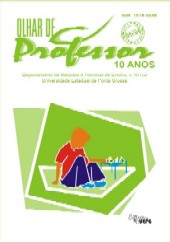QUANDO ENSINAR NÃO É O MAIS IMPORTANTE: REFLEXÕES SOBRE O TRABALHO DOCENTE E O OFÍCIO DO ALUNO NO CONTEXTO ATUAL
Main Article Content
Abstract
O objetivo do presente texto é analisar alguns aspectos do trabalho do professor e do ofício do aluno no contexto das profundas transformações contemporâneas. O trabalho foi constituído a partir do apoio teórico em autores que discutem o tema e em estudos recentes que abordam as questões aqui levantadas. Sempre que possível ilustro com alguns aspectos da política educacional adotada em dois estados brasileiros, nomeadamente o estado de Goiás e o estado de São Paulo. A análise enfoca três dimensões. A primeira delas se refere às mudanças no papel do Estado e suas repercussões sobre o campo educativo, enfocando o movimento de ‘responsabilização’ e ‘desresponsabilização’ e a gestão. A segunda diz respeito ao trabalho do professor, destacando a formação, as condições de trabalho e o sentido de ensinar na atualidade. A terceira trata especificamente do aluno e das novas situações com que este vem se defrontando, particularmente na sua conversão em cliente ou consumidor, bem como ao universo de exigências do mercado de trabalho e sua repercussão na escola. Finalizando, levanto a hipótese de que o conjunto dos processos a que a educação escolar vem sendo submetida em uma sociedade crescentemente regida pelo lucro pode levar a mudanças significativas nos sentidos da docência e na ética que orienta o trabalho do professor.
Downloads
Article Details
Authors who publish in this journal agree with the following terms:
a) Authors keep the copyrights and concede the right of its first publication to the magazine. The work piece must be simultaneously licensed on the Creative Commons Attribution License which allows the paper sharing, and preserves both the author identity and the right of first publication to this magazine.
b) Authors are authorized to assume additional contracts separately, to not-exclusively distribution of the paper version published in this magazine (e.g.: publish in institutional repository or as a book chapter), with the author identity recognition and its first publication in this magazine.
c) Authors are permitted and stimulated to publish and distribute their papers online (e.g.: in institutional repository or on their personal webpage), considering it can generate productive alterations, as well as increase the impact and the quotations of the published paper.
d) This journal provides public access to all its content, as this allows a greater visibility and reach of published articles and reviews. For more information on this approach, visit the Public Knowledge Project, a project that developed this system to improve the academic and public quality of the research, distributing OJS as well as other software to support the publication system of public access to academic sources.
e) The names and e-mail addresses on this site will be used exclusively for the purposes of the journal and are not available for other purposes.

This work is licensed under a Creative Commons Attribution 4.0 International License.

